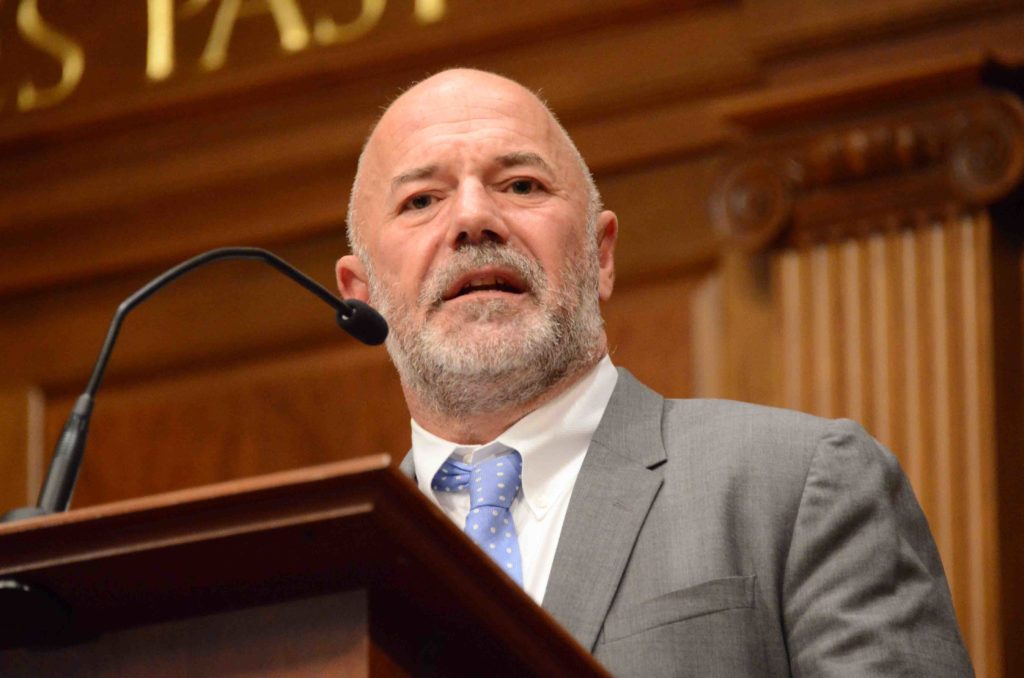Journalist Andrew Sullivan Shares His Personal Story
On October 26, Andrew Sullivan—prolific journalist, blogger, public intellectual, and media commentator for more than three decades—spoke with students in Hall about his work in the public sphere and his own personal story. A Catholic, conservative, out gay man, Mr. Sullivan has been a vocal advocate for gay rights, specifically gay marriage, for decades. A former editor of The New Republic, he was the founding editor of The Daily Dish, and has been a regular writer for The New York Times Magazine, The Atlantic, Time, Newsweek, New York magazine, The Sunday Times (London), and now The Weekly Dish. His most recent book, Out On a Limb, is a collection of his essays from 1989-2021.
Born in Surrey, England, into a Catholic family of Irish descent, Mr. Sullivan struggled with reconciling two parts of his identity—being both Catholic and gay.
“As I grew up, it occurred to me that I really shouldn’t exist,” Mr. Sullivan began. “I’ve spent my whole life being asked: How can you be gay and a Catholic? And it’s a good question. I’m going to try and explain it a little bit. The truth is you don’t choose these things. Choices—sometimes, somewhat—elaborate a rather arrogant idea of how human lives unfold.”
Mr. Sullivan went on to share the story of his growing up in a conservative, Catholic family; of realizing he was different from other boys; of the refuge his school represented in his life; and about coming to the United States on a scholarship and falling in love with America.
“If you grew up in class-structured England in the 1970s and early-’80s, America was paradise,” Mr. Sullivan said. “No one asked where you were from. No one asked how dare you do that. People were enthusiastic. People were individuals.” That freedom and openness he experienced here helped him decide to come out to his family and to pursue a career writing. With an internship at The New Republic, prompted by a conversation in the editorial room about domestic partnership for gay couples, he said, “Why don’t you just give them marriage? Isn’t that easier? You don’t have to come up with these new terms. You don’t have to create some rival institution.”
Mr. Sullivan wrote an essay making the case—the conservative case—for gay marriage, titled “Here Comes the Groom,” which became the issue’s cover story and, subsequently, a huge sensation.
“It began to dawn on me, maybe this is a good idea,” he said. “No one else had previously really talked about it. And eventually I decided this is going to be what I’m going to do. I’m going to try and campaign and argue and fight and bring this about. Maybe I won’t live long enough. Maybe it’ll happen sometime. Maybe in the future, who knows, someone will pick this up.”
Mr. Sullivan shared the ups and downs of his own professional and personal trajectory—climbing the ranks of journalism and media; struggling through the AIDS epidemic; experiencing a crisis of faith, and emerging from that.
“Even though I’d been given everything, God came in and said, none of this really matters. I learned that there will be ups and downs, there will be triumphs and catastrophes, but neither matter. What matters is the ability to keep going and to have faith that there is not meaninglessness, that there is not fathomless evil in the world. And that is hard enough.”
“You don’t know who you’re sitting next to right now, or where they will go. You have many parts of your life that contradict each other, that are in stress with one another. Be patient. Be yourself. Do not try to adjust to every identity you’re supposed to adjust to. Just be yourself with integrity and patience. And if you do that, and you breathe, the world will create a space for you. And when you have done that for yourself—when you have made the place in the world a little easier for you to live and breathe and be yourself—you won’t know it, but you will have done it for somebody else, as well. And when you think about what progress is, what advancement is, you can think in terms of laws and arguments, but what it really is, is human beings, slowly through the centuries, through the millennia, refusing to be anything other than they are, insisting upon that, and expanding the possibilities of freedom for everybody else.”
Over the course of his career, Mr. Sullivan has never shied away from staking out bold positions on social and political issues. A fiercely independent conservative, Mr. Sullivan wrote an essay titled “The Politics of Homosexuality,” published in The New Republic in 1993, which has been called the most consequential in the gay rights movement. A pioneer of online journalism, he started blogging in 2000 and helped define the new medium with his blog, The Daily Dish. In 2007, he was one of the first political writers to champion the presidential campaign of Barack Obama, and his cover story for The Atlantic, “Why Obama Matters,” was seen as a milestone in that campaign’s messaging. He has been a vocal foe both of Donald Trump and of wokeness on the left. Loved and loathed by both the political left and right, Mr. Sullivan, it has been said, is a tribe of one.
In his introduction of Mr. Sullivan, Headmaster Kerry Brennan said, “I am grateful to have with us this morning an individual who speaks the truth as he knows it, regardless of the popularity of his stance, and who—equally important—acknowledges when he’s gotten it wrong. I hope that his visit today inspires meaningful and respectful conversation in the days to come.”
After Hall, Mr. Sullivan spent time with students in classes throughout the day, answering their questions about a range of topics, from the media and conservatism to his personal story and background.

